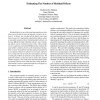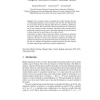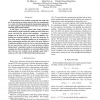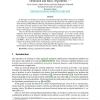600 search results - page 62 / 120 » Problems and results in extremal combinatorics - II |
HASE
1998
IEEE
14 years 1 months ago
1998
IEEE
Residual defects is one of the most important factors that allow one to decide if a piece of software is ready to be released. In theory, one can find all the defects and count th...
CONCUR
2007
Springer
14 years 1 months ago
2007
Springer
We re-examine vacuity in temporal logic model checking. We note two disturbing phenomena in recent results in this area. The first indicates that not all vacuities detected in prac...
ASPDAC
2001
ACM
14 years 26 days ago
2001
ACM
Clock-tuning has been classified as important but tough tasks due to the non-convex nature caused by the skew requirements. As a result, all existing mathematical programming appr...
LPAR
2010
Springer
13 years 7 months ago
2010
Springer
In this paper we introduce an extension of propositional logic that allows clauses to be weighted with values from a generic semiring. The main interest of this extension is that ...
TWC
2010
13 years 3 months ago
2010
In this paper, the training sequence design for multiple-input multiple-output (MIMO) orthogonal frequencydivision multiplexing (OFDM) systems under the minimum mean square error (...




